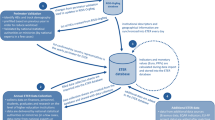Abstract
The article reviews various sources of educational data (e.g., international large-scale studies, data registers) and their use for policy decisions and research in Lithuania. It has been shown that a lot of data has already been collected and that more is being accumulated. Up to 20 percent of the information gathered is used for policy purposes and even less in research. It is noted that most of the data collected is useful for the economic paradigm. The chapter presents case study showing that national population-based studies and international achievement studies may send different messages and cannot be considered in isolation.
Access this chapter
Tax calculation will be finalised at checkout
Purchases are for personal use only
Similar content being viewed by others
Notes
- 1.
- 2.
- 3.
ILSA-Gateway: PISA 2018 Results | ILSA-Gateway.
References
Addey, C.: Golden relics & historical standards: how the OECD is expanding global education governance through PISA for development. Crit. Stud. Educ. (2017). https://doi.org/10.1080/17508487.2017.1352006
Addey, C., Sellar, S., Steiner-Khamsi, G., Lingard, B., Verger, A.: The rise of international large-scale assessments and rationales for participation. Comp.: J. Comp. Int. Educ. 47(3), 434–452 (2017)
Baird, J.-A., Johnson, S., Hopfenbeck, T.N., Isaacs, T., Sprague, T., Stobart, G., Yu, G.: On the supranational spell of PISA in policy. Educ. Res. 58(2), 121–138 (2016)
Clarke, M., Luna-Bazaldua, D.: Primer on Large-Scale Assessments of Educational Achievement. International Bank for Reconstruction and Development/The World Bank, Washington, DC (2021)
Fischman, G.E., Topper, A.M., Silova, I., Goebel, J., Holloway, J.L.: Examining the influence of international large-scale assessments on national education policies. J. Educ. Policy (2018). https://doi.org/10.1080/02680939.2018.1460493
Gorur, R., Wu, M.: Leaning too far? PISA, policy and Australia's ‘top five’ ambitions. Discourse: Stud. Cult. Polit. Educ. 36(5), 647–664 (2015)
Grek, S.: Governing by numbers: the PISA ‘Effect’ in Europe. J. Educ. Policy 24(1), 23–37 (2009)
European Commission.: Education and training monitor (2021). Internet access: https://op.europa.eu/webpub/eac/education-and-training-monitor-2021/en/
Jakaitienė, A., Želvys, R., Vaitekaitis, J., Raižienė, S., Dukynaitė, R.: Centralised mathematics assessments of Lithuani-an secondary school students: population analysis. Inform. Educ. 20(3), 439–462 (2021)
Jakupec, V., Meier, B.: PISA—Schocks, after shocks and misconceptions. Leibniz Online (17), 1–11 (2015). Internet access: http://www.leibnizsozietaet.de/wp-content/uploads/2015/02/JakupecMeier.pdf
King, K.: Lost in translation? The challenge of translating the global education goal and targets into global indicators. Comp.: J. Comp. Int. Educ. 47(6), 801–817 (2017)
Lockheed, M.L., Wagemaker, H.: International large-scale assessments: thermometers, whips or useful polcy tools? Res. Comp. Int. Educ. 8(3), 296–306 (2013)
OECD.: Reviews of National Policies for Education. Lithuania. OECD Publications, Paris (2002)
OECD.: Analyses with Plausible Values. In: PISA Data Analysis Manual: SPSS, 2nd edn. OECD Publishing, Paris (2009).https://doi.org/10.1787/9789264056275-9-en
OECD.: Reviews of national policies for education. Educ. Lith. (2017). Internet access: https://read.oecd-ilibrary.org/education/education-in-lithuania_9789264281486-en#page1
OECD.: Education at a Glance 2021. OECD Indicators (2021). Internet access: https://www.oecd.org/education/education-at-a-glance/
Ozga, J.: Governing education through data in England: from regulation to self-evaluation. J. Educ. Policy 24(2), 149–162 (2009)
Sahlber, P.: PISA in Finland: an education miracle or an obstacle to change? CEPS J. 1(3), 119–140 (2011)
Sahlberg, P.: THe global educational reform movement and its impact on schooling. In: Mundy, K., Green, A., Lingard, B., Venger, A. (eds.) The Handbook of Global Education Policy, pp. 128–144. Wiley (2016)
Selwyn, N.: Data entry: towards the critical study of digital data and education. Learn. Media Technol. 40(1), 64–82 (2015)
Sjøberg, S.: PISA and “real life challenges”: Mission impossible? In: Hopman, S.T., Brinek, G., Retzl, M. (eds.) PISA According to PISA—Does PISA Keep What it Promises?, pp. 203–225. Lit Verlag, Berlin (2007)
Sjøberg, S.: The PISA-syndrome—how the OECD has hijacked the way we perceive pupils, schools and education. Confero 7(1), 12–65 (2019)
Steiner-Khamsi, G., Waldow, F.: PISA for scandalisation, PISA for projection: the use of international large-scale assessments in education policy making—an introduction. Glob. Soc. Educ. 16(5), 557–565 (2018)
Takayama, K., Lingard, B.: Datafication of schooling in Japan: an epistemic critique through the ‘problem of Japanese education.’ J. Educ. Policy 34(4), 449–469 (2019)
Tampayeva, G.Y.: Importing education: Europeanisation and the bologna process in Europe‘s backyard—the case of Kazakhstan. Eur. Educ. Res. J. 14(1), 74–85 (2015)
The Council of the European Union.: Council resolution on a strategic framework for European cooperation in education and training towards the European Education Area and beyond (2021–2030) (2021). Internet access: https://eur-lex.europa.eu/legal-content/EN/TXT/PDF/?uri=CELEX:32021G0226(01)&from=EN
Tyumeneva, Y.: Disseminating and Using Student Assessment Information in Russia. The International Bank for Reconstruction and Development/The World Bank, Washington (2013)
UNESCO: Global education monitoring report, 2021/2: non-state actors in education: who chooses? who loses? UNESCO, Paris (2021)
Williamson, B.: Big Data in Education: The Digital Future of Learning, Policy and Practice. Sage, London (2017)
Author information
Authors and Affiliations
Corresponding author
Editor information
Editors and Affiliations
Rights and permissions
Copyright information
© 2023 The Author(s), under exclusive license to Springer Nature Switzerland AG
About this chapter
Cite this chapter
Jakaitienė, A., Želvys, R., Dukynaitė, R. (2023). Education Data for Science: Case of Lithuania. In: Dzemyda, G., Bernatavičienė, J., Kacprzyk, J. (eds) Data Science in Applications. Studies in Computational Intelligence, vol 1084. Springer, Cham. https://doi.org/10.1007/978-3-031-24453-7_2
Download citation
DOI: https://doi.org/10.1007/978-3-031-24453-7_2
Published:
Publisher Name: Springer, Cham
Print ISBN: 978-3-031-24452-0
Online ISBN: 978-3-031-24453-7
eBook Packages: Intelligent Technologies and RoboticsIntelligent Technologies and Robotics (R0)




